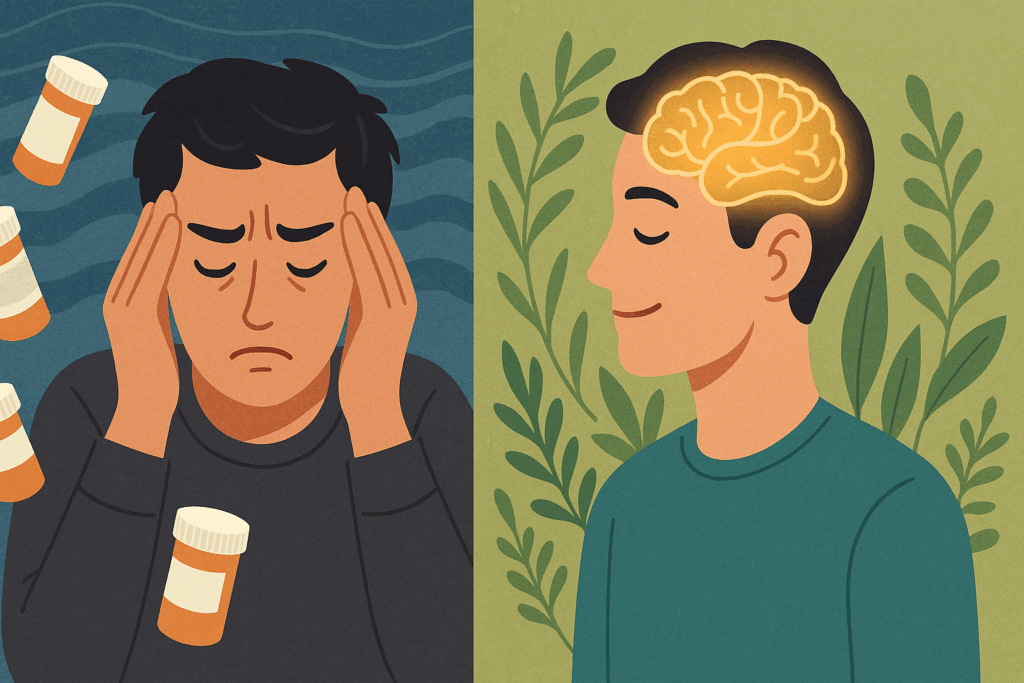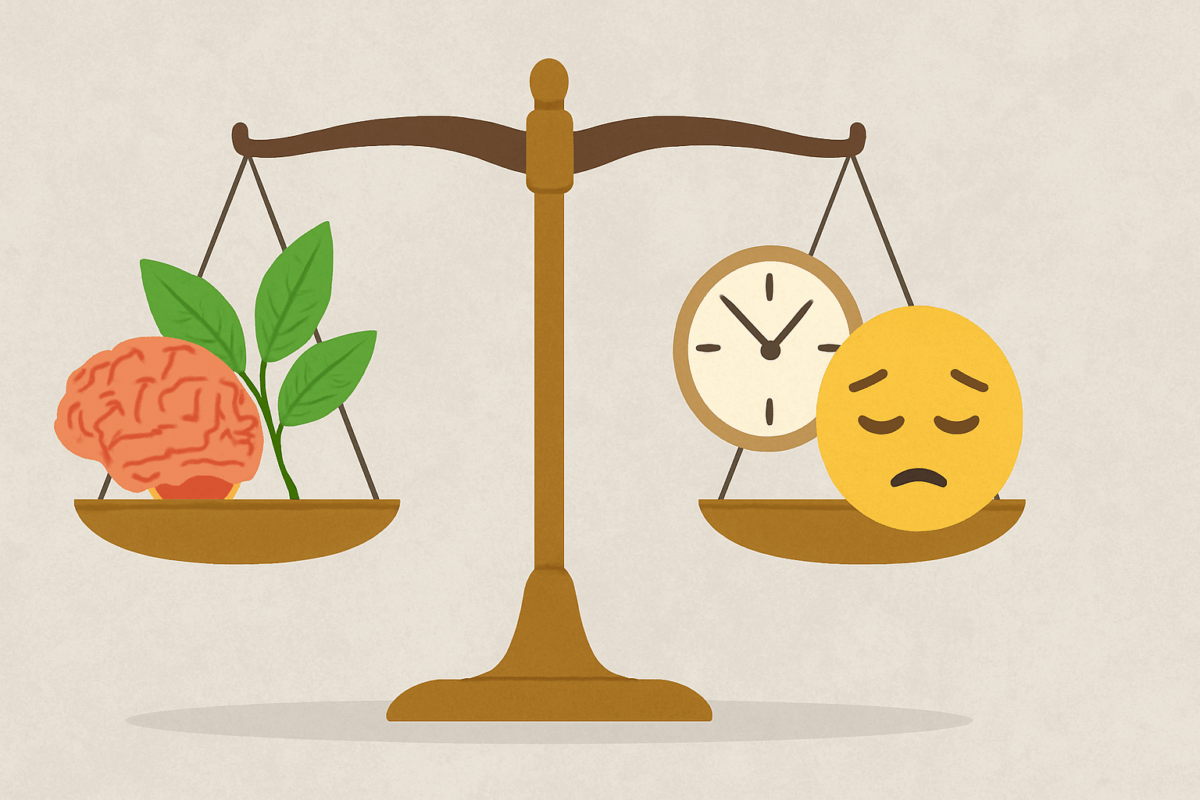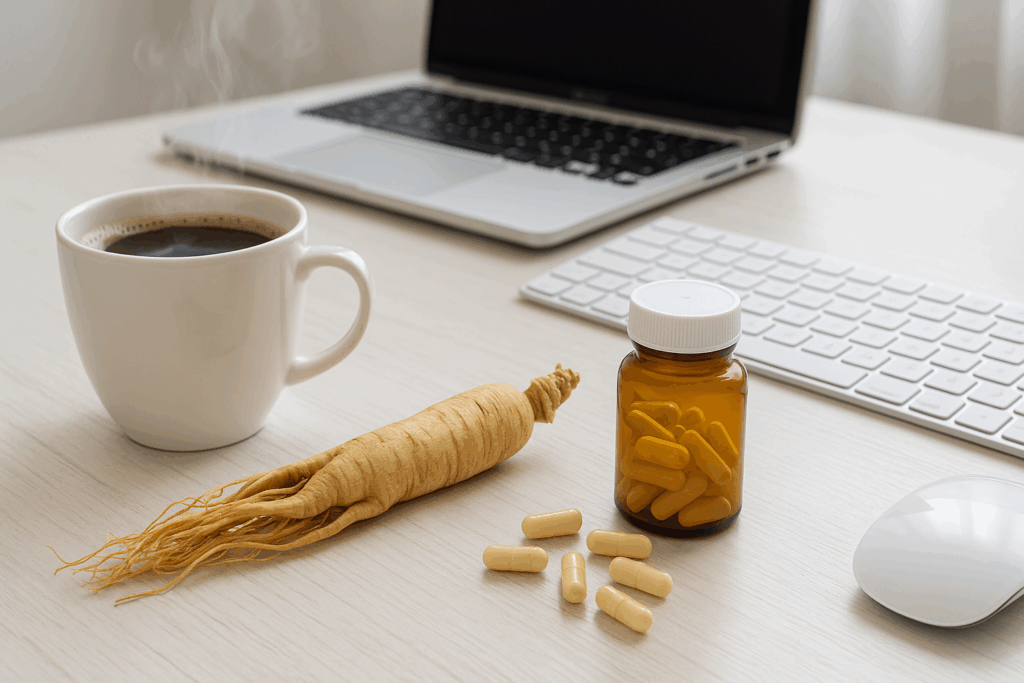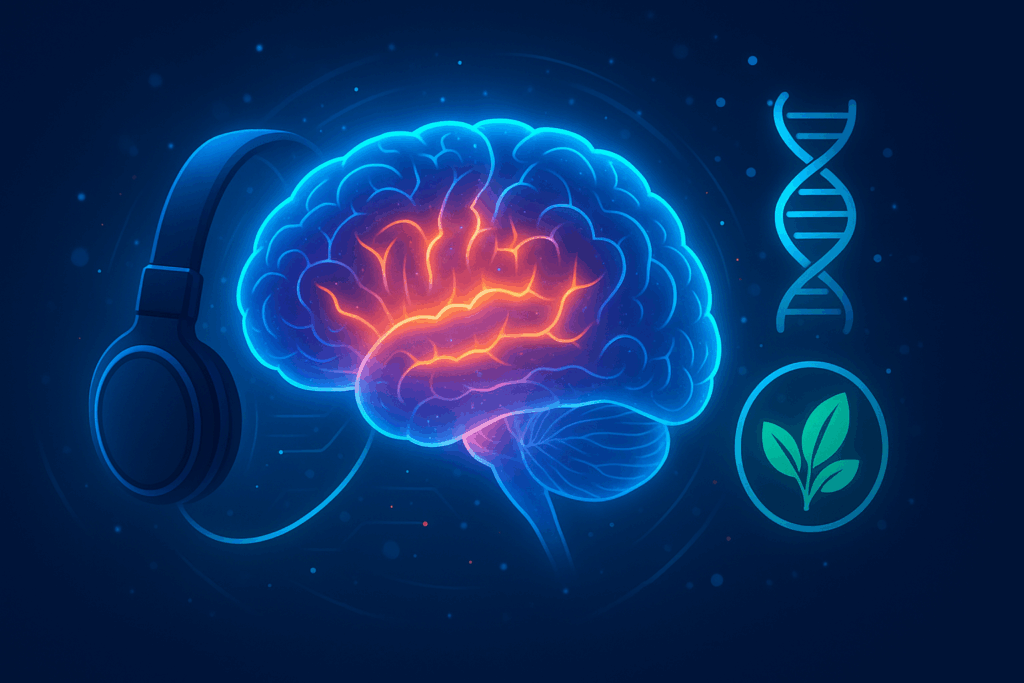Introduction: Shifting the Focus Beyond Traditional ADHD Treatments
In today’s fast-paced world, maintaining focus, emotional regulation, and cognitive clarity has never been more critical. For those diagnosed with attention deficit hyperactivity disorder (ADHD), the challenge of sustaining attention or curbing impulsivity can be overwhelming without the right therapeutic tools. Historically, stimulant medications such as methylphenidate and amphetamines dominated ADHD treatment. Yet, the conversation is evolving. Increasingly, patients, physicians, and researchers are exploring non stimulant ADHD medications and over the counter ADHD medication options that offer similar cognitive benefits without the potential downsides often associated with traditional stimulants.
You may also like: How to Choose the Best Brain Supplements for Adults: Science-Backed Ingredients That Support Focus, Memory, and Mental Clarity
This shift is not merely a trend; it reflects a broader, evidence-based reconsideration of how we approach attention enhancement and decision-making support. Today, there is significant interest in non stimulant drugs for ADHD and non prescription ADHD medicine, especially for adults seeking sustained cognitive support without stimulant-associated risks. Moreover, the rise of legal nootropics—cognitive enhancers that improve executive functions like focus and decision-making—has opened new possibilities for individuals who either cannot tolerate or prefer not to use traditional stimulant therapies. This article takes an in-depth, medically accurate, and SEO-optimized journey through the world of non stimulant ADHD treatments and safe over-the-counter alternatives, aiming to help readers make informed, confident choices.

Understanding the Need for Non Stimulant ADHD Medications
The traditional use of stimulant medications for ADHD, while effective for many, is not universally suitable. Some individuals experience significant side effects, including insomnia, appetite suppression, elevated blood pressure, or emotional blunting. Others may have a history of substance abuse, making stimulant use risky. In such cases, non stimulant ADHD meds provide a crucial alternative that addresses symptoms without the heightened risk of dependency.
Non stimulant ADHD medication options, such as atomoxetine and guanfacine, work differently from stimulants. They often target norepinephrine or specific brain receptors, promoting focus and impulse control without directly stimulating dopamine surges. This difference can result in a gentler side effect profile and longer-lasting symptom management. Furthermore, non stimulant treatment for ADHD can sometimes be better suited for individuals with co-existing conditions like anxiety or mood disorders, where stimulants may exacerbate symptoms.
The interest in non stimulant ADHD extends to those seeking non prescription medication for ADHD, particularly adults who are balancing career, family, and personal development goals. Unlike their stimulant counterparts, these options offer a perception of safer, more sustainable cognitive enhancement, emphasizing functionality without the risk of hyperarousal or dependency.
How Non Stimulant ADHD Medications Work
While stimulant medications primarily increase dopamine and norepinephrine activity in the brain’s prefrontal cortex, non stimulant ADHD meds employ a more targeted, regulated approach. Atomoxetine, for example, is a norepinephrine reuptake inhibitor, designed to boost norepinephrine levels without the intense dopaminergic activity that characterizes stimulant use. This mechanism can gradually improve attention, decrease impulsivity, and enhance emotional regulation over time.
Understanding how non stimulant ADHD medications work helps demystify why they are often preferred for long-term cognitive support. These medications generally have a slower onset, taking days or weeks to reach full therapeutic effect, compared to the rapid action of stimulants. Yet, their benefits tend to be more stable, reducing the “ups and downs” often experienced with stimulant medications.
The nuanced approach offered by non stimulant ADHD meds for adults especially caters to individuals who require a steady cognitive boost throughout the day without disruptive peaks or crashes. Additionally, because non stimulant ADHD medications for adults are less likely to be classified as controlled substances, they often come with fewer regulatory restrictions, simplifying access for those in need.

Over-the-Counter Alternatives to ADHD Medications: A Growing Frontier
As awareness about the limitations of traditional stimulant therapies increases, so too does interest in over the counter ADHD medication and related non prescription ADHD medicine options. Adults, in particular, seek focus meds no ADHD diagnosis required, emphasizing performance enhancement, memory support, and sustained attention without the burdens of medical oversight or potential legal ramifications.
Popular over-the-counter alternatives to ADHD medication include a range of nootropics, natural supplements, and herbal remedies. Ingredients such as L-theanine, Bacopa monnieri, Rhodiola rosea, and omega-3 fatty acids have garnered attention for their ability to support cognitive function safely and effectively. These substances typically promote neuroplasticity, neurotransmitter balance, and stress resilience—all critical factors for focus and decision-making optimization.
Nevertheless, it is crucial to approach non prescription ADHD medication for adults with informed discernment. Not all supplements marketed as alternatives to ADHD meds possess clinically significant effects, and quality control can vary widely. Therefore, sourcing products from reputable manufacturers and consulting healthcare professionals where possible remains an essential best practice.
The Advantages and Disadvantages of Non Stimulant ADHD Drugs for Adults
Non stimulant ADHD drugs for adults offer numerous advantages, but they also come with important considerations. On the positive side, non stimulant add medication for adults often results in fewer cardiovascular side effects, reduced potential for misuse, and improved sleep compared to traditional stimulants. This makes them particularly attractive to individuals with underlying health concerns or lifestyle preferences that prioritize long-term well-being.
Moreover, non addictive ADHD medication options, particularly those derived from natural or over-the-counter sources, align well with the needs of adults seeking gradual, sustainable cognitive enhancement. These individuals often value the ability to maintain clear, steady attention without the dramatic mood or energy swings sometimes caused by stimulants.
However, one of the primary disadvantages is that non stimulant medications for attention deficit disorder typically take longer to exhibit noticeable effects. In a culture accustomed to immediate results, the need for patience and consistency can deter some users. Additionally, while non stimulant ADHD medications for adults offer improved safety profiles, they are not devoid of side effects, which may include drowsiness, gastrointestinal discomfort, or mood changes in some cases.
Exploring Alternatives to ADHD Medication for Cognitive Enhancement
Beyond formal prescriptions, a wide range of ADHD alternatives to drugs exists to support individuals struggling with attention challenges. Cognitive behavioral therapy (CBT), mindfulness practices, exercise regimens, and dietary interventions have all demonstrated varying degrees of efficacy in improving executive function and focus.
Mindfulness training, for instance, teaches individuals to observe their thoughts and behaviors without judgment, enhancing self-regulation and attention control over time. Exercise, particularly aerobic activities like running or swimming, boosts dopamine and norepinephrine naturally, offering a biological mechanism for improving focus without pharmacological intervention.
These approaches represent more than mere complements to pharmaceutical interventions; they are robust, evidence-based ADHD alternatives to drugs that can empower individuals to manage their symptoms holistically. When combined with safe cognitive enhancers such as OTC ADHD supplements, these lifestyle strategies can create a multifaceted, sustainable path toward improved focus and decision-making abilities.

Evaluating the Best OTC Stimulants for ADHD Symptoms
While true stimulants require prescription oversight, several over-the-counter supplements mimic certain stimulant effects, offering mild boosts in alertness, energy, and cognitive performance. Ingredients such as caffeine, Panax ginseng, and theacrine have been explored for their potential as otc stimulants for ADHD support.
Caffeine, while ubiquitous, remains one of the best OTC stimulants when used judiciously. It enhances dopamine signaling, improves reaction time, and increases alertness, although tolerance and dependency can develop with excessive use. Theacrine offers a promising alternative, delivering similar cognitive benefits with reduced habituation risks.
When considering otc adhd solutions, it is essential to weigh the balance between efficacy and safety. Responsible dosing, timing, and quality sourcing are vital to ensure that the pursuit of cognitive enhancement through the best otc stimulants does not inadvertently result in overstimulation or adverse health effects.
Non Controlled ADHD Medications: Safe and Sustainable Options
One of the most significant appeals of non stimulant ADHD medications lies in their non controlled status. Unlike traditional stimulants, which are classified as Schedule II substances due to their abuse potential, many non stimulant ADHD options and nootropic supplements are not subject to the same stringent legal controls.
Non controlled ADHD medication alternatives provide a sense of autonomy and empowerment for users, allowing them to manage their cognitive challenges without fear of legal complications or stigma. This freedom is particularly valuable in professional environments, where disclosure of controlled substance use can sometimes impact employment or security clearance opportunities.
However, the absence of regulatory oversight also places greater responsibility on the consumer to research and select safe, evidence-backed products. Understanding how do non stimulant ADHD meds work, and ensuring the chosen interventions are scientifically validated, becomes a critical component of responsible self-care.
Are Non Stimulant ADHD Medications Effective? What the Science Says
For those questioning, are non stimulant ADHD medications effective, the answer, according to contemporary research, is nuanced but promising. Numerous clinical studies have confirmed the efficacy of atomoxetine, guanfacine, and clonidine in managing ADHD symptoms, particularly in adults and individuals with coexisting conditions.
Although non stimulant ADHD medications generally exhibit slightly lower effect sizes compared to stimulant medications, they offer unique benefits in terms of emotional regulation, sleep support, and reduced abuse potential. Additionally, for individuals who are unable to tolerate stimulants or have specific health concerns, non stimulant treatments often provide a lifeline to improved quality of life.
The key to maximizing effectiveness lies in individualized care. Tailoring non stimulant ADHD meds for adults to each person’s unique neurochemical profile, lifestyle demands, and therapeutic goals often results in the most successful outcomes.

How Non Stimulants Work for ADHD: A Deeper Understanding
Gaining insight into how non stimulants work for ADHD reveals the sophistication of modern neuropharmacology. Unlike stimulants, which flood the brain with increased dopamine levels, non stimulants subtly modulate neurotransmitter pathways to enhance focus and executive functioning.
For instance, guanfacine works by stimulating alpha-2A adrenergic receptors, which strengthens the prefrontal cortex’s ability to regulate attention and behavior. Atomoxetine selectively increases norepinephrine, supporting both focus and emotional stability without inducing euphoria or dependency.
Understanding how does non stimulant ADHD medication work underscores why these treatments often require patience. Their gradual, foundational impact on brain chemistry builds resilience and cognitive strength over time, offering a sustainable path to improved focus and decision-making rather than a quick but fleeting fix.
The Future of ADHD Treatment: Integrating Safe Cognitive Enhancers
As research continues to expand our understanding of cognitive enhancement, the future of ADHD treatment will likely involve a greater blending of traditional pharmaceutical approaches with over-the-counter options, behavioral interventions, and legal nootropics. Personalized medicine, where treatments are tailored based on genetic, neurochemical, and lifestyle factors, promises to make ADHD care more effective and humane.
In this evolving landscape, focus meds no ADHD diagnosis needed, such as safe OTC nootropics and non prescription ADHD medication for adults, will likely play an increasingly prominent role. Individuals seeking improved decision-making optimization will have access to a broader toolkit that respects their unique needs, preferences, and goals.
Ultimately, the conversation surrounding non stimulant ADHD medications and over the counter ADHD medication options reflects a deeper shift in how we think about cognitive health: not merely as the absence of disorder, but as an active, dynamic process of nurturing and optimizing the brain’s incredible potential.
FAQ: Non Stimulant ADHD Medications and Over-the-Counter Alternatives
1. How do non stimulant ADHD medications work compared to stimulants?
Unlike traditional stimulants that immediately boost dopamine and norepinephrine, non stimulant ADHD medications work by gradually modulating neurotransmitter activity over time. This slower mechanism allows for a more stable, sustained improvement in focus without the peaks and crashes often seen with stimulants. Many non stimulant drugs for ADHD target different brain receptors entirely, like norepinephrine reuptake inhibitors (NRIs) or alpha-2 adrenergic agonists. This difference explains why non stimulant ADHD meds for adults are often favored for people with sensitivity to rapid mood swings. If you’re seeking non controlled ADHD medication options, non stimulants can offer a gentler, more predictable path toward symptom management.
2. Are non stimulant ADHD medications effective for severe cases?
The question of “are non stimulant ADHD medications effective for severe ADHD?” depends largely on individual brain chemistry. While some individuals with moderate ADHD thrive on non stimulant ADHD meds, those with extreme hyperactivity may still require combination treatments. That said, non stimulant treatment for ADHD can be customized, sometimes involving careful titration or adjunct therapies like cognitive behavioral therapy (CBT). Many emerging studies show that non stimulant ADHD drugs for adults, when combined with lifestyle changes like sleep optimization, can rival the efficacy of stimulants for some severe cases. Always consult a specialist before assuming one type of medication is universally better.
3. Can non stimulant ADHD meds be combined with supplements for better focus?
Yes, and this is an emerging area of interest in integrative psychiatry. Some adults use non stimulant ADHD medication while also incorporating brain-boosting supplements like omega-3 fatty acids or phosphatidylserine for cognitive enhancement. These combinations aim to create a synergistic effect, helping to optimize neurotransmitter function naturally. If you’re exploring alternatives to ADHD medication, adding natural nootropic compounds alongside non stimulant ADHD meds for adults could offer additional cognitive support. However, always discuss potential supplement-drug interactions with your healthcare provider to avoid unintended side effects.
4. How do non stimulants work for ADHD without causing addiction?
One of the greatest advantages of non stimulant medications for attention deficit disorder is their very low abuse potential. Since they don’t flood the brain with a rapid surge of dopamine, non stimulant ADHD meds avoid creating the euphoric “high” that can lead to dependence. For adults concerned about substance misuse, choosing a non addictive ADHD medication may provide peace of mind. Long-term studies show that patients on non stimulant ADHD medications for adults often maintain consistent dosing without needing to escalate. This makes non stimulant ADD medication for adults particularly valuable for those with a history of substance use concerns.
5. What are some over the counter ADHD medication options available?
If you’re wondering about over the counter ADHD medication, know that no true prescription-strength ADHD meds are available OTC. However, several supplements function as focus meds no ADHD diagnosis required, helping users sharpen mental clarity naturally. Ingredients like L-tyrosine, Rhodiola rosea, and citicoline are found in some of the best OTC stimulants for ADHD symptom management. These compounds promote alertness and cognitive energy without the risks tied to prescription drugs. If you are searching for non prescription ADHD medication for adults, quality nootropic supplements from trusted brands may be worth considering.

6. How does non stimulant ADHD medication work differently for adults compared to children?
The adult brain responds to non stimulant ADHD medications differently due to fully matured neural pathways and hormone balances. Non stimulant ADHD meds for adults often target executive function deficits like procrastination, emotional regulation, and sustained attention rather than overt hyperactivity. This is why non stimulant ADHD medications for adults sometimes prioritize norepinephrine modulation over dopamine pathways. In pediatric patients, impulse control is often the focus, leading to a slightly different pharmacological emphasis. Understanding this developmental nuance is key when selecting alternatives to ADHD meds at different life stages.
7. Are there non prescription medications for ADHD that actually work?
While no non prescription medication for ADHD can replace the effectiveness of a tailored prescription plan, certain natural formulations offer significant support. Non prescription ADHD medicine often combines adaptogens, amino acids, and vitamins to optimize brain health. Research into non stimulant ADHD meds for adults also highlights that adjunctive nonprescription supplements like L-theanine and magnesium glycinate may improve attention spans. If you’re hesitant about controlled substances, exploring non prescription ADHD medication for adults with proven clinical backing could be a valuable interim solution. Always prioritize third-party-tested supplements for maximum safety and reliability.
8. What are promising future developments in non stimulant ADHD treatments?
The landscape of non stimulant ADHD is rapidly evolving. Researchers are now exploring novel compounds that influence glutamate pathways rather than the traditional catecholamine systems. Additionally, personalized medicine approaches could soon allow for DNA-guided selection of the best non stimulant ADHD medications for adults based on genetic markers. Advances in wearable tech are also helping to optimize dosing schedules, improving the efficacy of non stimulant drugs for ADHD. These innovations could dramatically shift the future of non prescription medication for ADHD by offering more targeted, side-effect-free solutions. The coming years may bring even more powerful alternatives to ADHD medication that cater to highly specific cognitive needs.
9. What lifestyle changes enhance the effectiveness of non stimulant ADHD meds?
Lifestyle optimization plays a pivotal role in maximizing the benefits of non stimulant treatment for ADHD. Sleep regulation, mindfulness practices, and physical exercise help balance neurotransmitters naturally, amplifying the effects of non stimulant ADHD medication. Some patients even adopt time-restricted eating patterns to stabilize energy levels throughout the day. Combining such holistic strategies with non stimulant medications for attention deficit disorder can yield more comprehensive symptom control than medication alone. If you’re exploring ADHD alternatives to drugs entirely, remember that sustainable lifestyle shifts are often the foundation of long-term success.
10. What should patients know before switching from stimulants to non stimulant ADHD drugs for adults?
Transitioning from stimulant-based therapy to non stimulant ADHD drugs for adults requires careful planning. Sudden discontinuation of stimulants can lead to withdrawal symptoms, so tapering under medical supervision is crucial. It’s also important to adjust expectations: non stimulant ADHD meds for adults often take several weeks to show full therapeutic effects. Some individuals find that combining a lower-dose stimulant with a non stimulant medication during the transition phase offers smoother symptom coverage. Understanding how non stimulant ADHD medications work — slower onset, fewer side effects, and sustainable benefits — can help make the switch much less stressful and far more successful.
Conclusion: Empowering Cognitive Health with Non Stimulant ADHD Treatments and Safe Alternatives
The journey toward optimal cognitive performance and decision-making clarity is no longer confined to the limited pathways of traditional stimulant medications. Exploring non stimulant ADHD medications and over-the-counter alternatives reveals a dynamic, expanding frontier that empowers individuals to make choices rooted in safety, effectiveness, and personal empowerment.
Whether through non stimulant drugs for ADHD, non prescription ADHD medication, or carefully selected OTC stimulants for ADHD, modern options allow adults to find solutions that align with their cognitive needs and lifestyle aspirations. Understanding how non stimulant ADHD meds work, and recognizing that non controlled ADHD medication choices can offer sustainable benefits without sacrificing health, fosters a new era of informed, proactive mental wellness.
As science continues to validate and refine these alternatives, it becomes clear that effective ADHD management—and broader cognitive optimization—requires a multifaceted, personalized approach. By embracing safe cognitive enhancers and legal nootropics alongside evidence-based therapies, individuals can unlock their fullest potential with confidence, resilience, and clarity.


